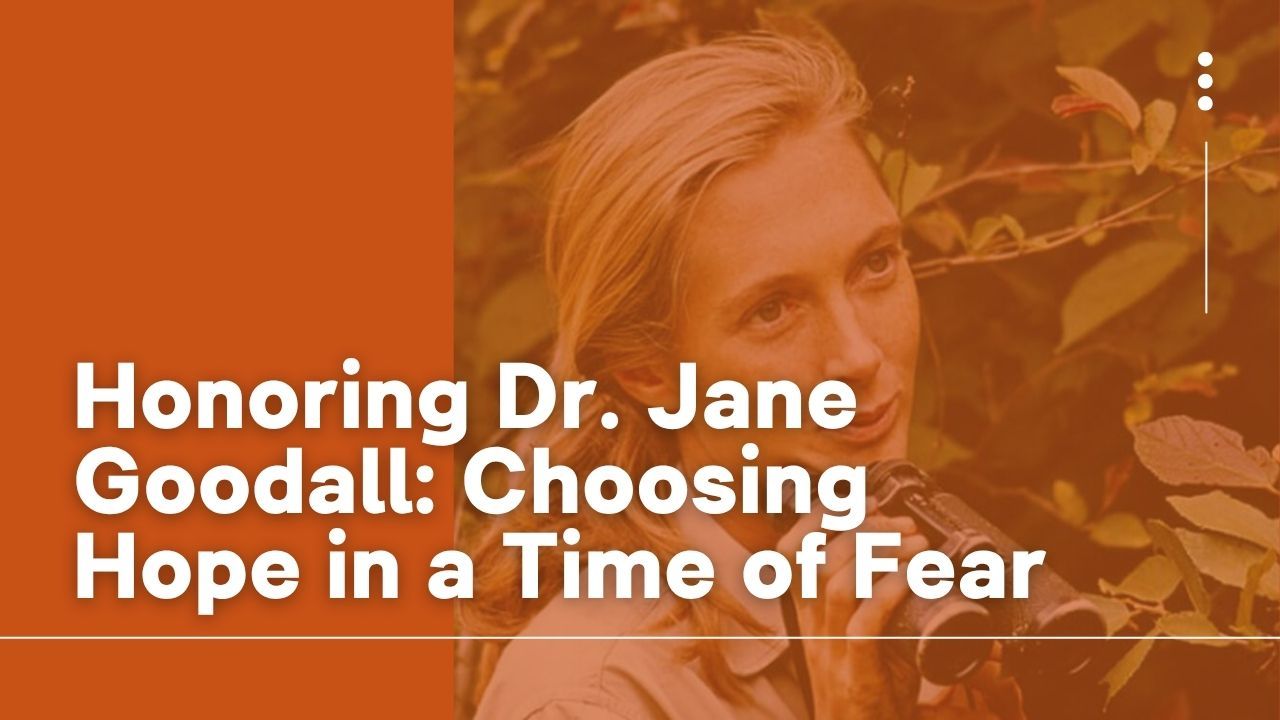Honoring Dr. Jane Goodall: Choosing Hope in a Time of Fear
Oct 02, 2025
The world lost a legend this week. Dr. Jane Goodall passed away on October 1, 2025, at age 91, and while headlines capture her as a pioneering primatologist and conservationist, what I’ll always remember is how much hope she carried and shared.
I was lucky enough to hear Dr. Goodall speak twice. Once in Dallas when I was a student at Baylor — I drove up and took my mom with me. And again in Washington, DC, while I was in graduate school. Both times, she spoke with a quiet conviction and proof that one person can make a difference, even when the problems she described felt overwhelming.
A life that reshaped how we see ourselves
Many of us first learned about Jane Goodall through that iconic National Geographic film, the young woman venturing into the forests of Tanzania to study chimpanzees in the wild. She wasn’t a formally trained scientist at the time. She was simply curious, observant, and brave enough to do what no one else had done.
Her research blew apart old assumptions. She showed the world that chimpanzees use tools, feel emotions, show cruelty, grieve their dead, and build social bonds. Behaviors once thought to separate humans from animals weren’t so distinct after all.
But she didn’t stop with observation. She fought to protect the land where chimpanzees lived, and, importantly, she partnered with local communities so that protecting wildlife also meant creating sustainable livelihoods. She understood that conservation without people doesn’t work.
And for decades, she traveled the world, often 300 days a year, not just talking about chimpanzees, but about the environment, climate, and our responsibility to act. What struck me was that she never sugarcoated the damage humans have done to the planet, but she also never gave up on hope.
Walking her talk
What made Jane Goodall so compelling wasn’t just her research. It was her consistency. She lived the values she preached:
-
She ate low on the food chain, adopting a mostly plant-based diet to reduce her environmental impact.
-
She minimized waste and lived simply, careful that her lifestyle matched her message.
-
She believed in starting with the next generation, founding Roots & Shoots to empower young people to lead change in their own communities.
Her quote captures her philosophy perfectly:
“You cannot get through a single day without having an impact on the world around you. What you do makes a difference, and you have to decide what kind of difference you want to make.”
Why her legacy matters now
We’re living in a time of deep division, misinformation, and fear. It’s easy to feel powerless. But Dr. Goodall’s life is a reminder that the small choices we make, how we treat each other, how we use resources, how we choose to show up, have a huge impact.
At Culture Grove, I often say culture isn’t something you fix, it’s something you cultivate. Jane Goodall modeled that truth on a global scale. She cultivated awareness, compassion, and action, patiently, persistently, and with hope.
That’s the kind of leadership our world, and our workplaces, need right now. Not quick fixes or surface-level slogans, but the slow, steady work of building environments where people (and nature) can thrive.
Carrying her torch
Hearing Dr. Goodall all those years ago shaped the way I think about impact. She believed that every act, no matter how small, mattered. And she proved it through a lifetime of action.
As we honor her legacy, my invitation to you is the same one she gave to all of us: pause and ask yourself, What kind of difference do I want to make today?
If enough of us keep asking that question, and acting on it, we can push back against fear and hate with something stronger: hope.
P.S. If you’ve never read any of Dr. Goodall’s books, I encourage you to pick one up. Reason for Hope is part memoir, part call to action, and still one of the most powerful reflections I’ve ever read. My Life with the Chimpanzees brings you into her earliest days at Gombe with vivid storytelling, while The Book of Hope, written later in her life, captures the optimism she carried even in the face of global crises.
Get your copy of our free Weekly Culture Checklist now!
Stay connected with news and updates!
Join our mailing list to receive our culture tip of the week.
Don't worry, your information will not be shared.
We hate SPAM. We will never sell your information, for any reason.

